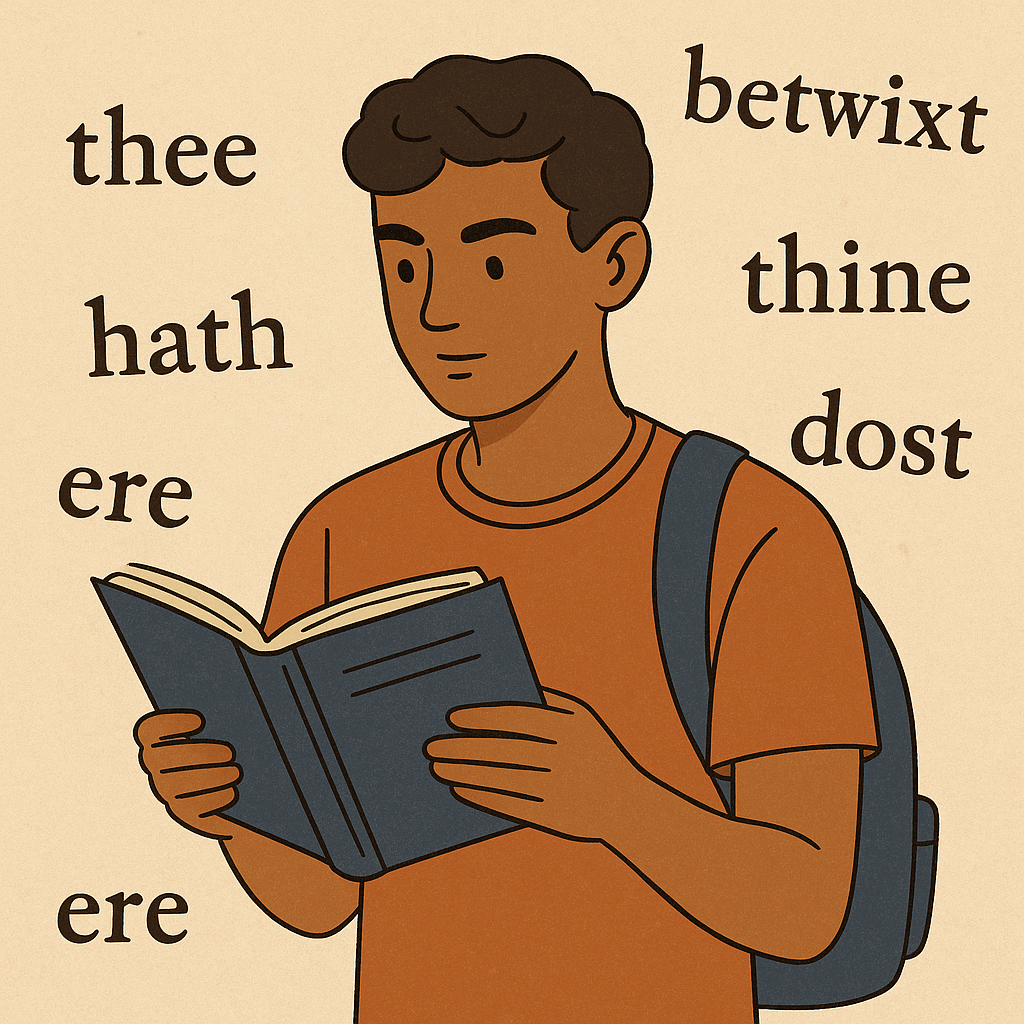Subscribe to our newsletter
Thank you! We got you!
Oops! Something went wrong. Try again!

Poetry has a reputation for being tricky — and one of the main reasons is vocabulary. When students encounter older poems, especially those written before the 1900s, the language can feel like a completely different version of English. That’s because it is.
The English language is constantly evolving, but poetry often preserves older forms and formal styles. Poets use words that might sound outdated today or carry meanings that have shifted over time. If you’ve ever read a sonnet and thought, what on earth does “thou art” mean?, you’re not alone.
Let’s look at an example.
Below is an excerpt from John Burken’s 1687 poem “Sonnet 16.”
Thou art more fair than blossoms newly sprung,
Whose scent hath fled ere yet their song be sung.
The fleeting bloom lies silent, wilted, wrung,
But thou stay’st sweet while all the world’s unsung.
This language might look intimidating at first — but it’s really just English dressed in older clothes. If we translate the first two lines into modern language, we get:
“You are more beautiful than newly bloomed flowers, whose scent disappears before their song is finished.”
Once you understand the vocabulary, the meaning becomes clear. The poet is comparing his beloved to flowers that fade too quickly — her beauty and sweetness, unlike theirs, endure.
So when the SAT asks a question like:
“Which choice best describes the function of the underlined portion in the text as a whole?”
and the answer choices include:
A. It elaborates on a similarity between the speaker’s beloved and flowers introduced in the previous line
B. It conveys the ephemeral beauty of flowers, which is framed in contrast to the speaker’s enduring feelings for his beloved
C. It utilizes a metaphor to characterize the speaker’s beloved as beautiful but superficial
D. It expresses the speaker’s admiration for flowers, which he compares favorably to the song of his beloved
The best answer is B. Once you’ve decoded the language, you can see that the poet contrasts the fleeting beauty of flowers with his beloved’s lasting beauty and his eternal love.
If you’ve ever read Shakespeare or any poem from the 16th–18th centuries, you’ll notice that the same “strange” words tend to appear again and again. We call these Shakespeare Words — and once you memorize a few, reading old poems becomes much easier.
Here are some of the most common ones you’ll see on the SAT or in classical literature:
| Word | Meaning |
|---|---|
| anon | now |
| art | are |
| beseech | to beg or implore |
| betwixt | between |
| cleave | to split or to cling to |
| doth / dost | does / do |
| ere | before |
| fair | beautiful |
| fie | an exclamation of disgust |
| forswear | to deny under oath |
| hark | listen |
| hence / hither / thither | away / here / there |
| mirth | cheerfulness |
| naught | nothing |
| oft | often |
| pray / prithee | please |
| quoth | said |
| thee / thou / thy / thine | you / your |
| whence / whither / wherefore | from where / to where / why |
| yonder | over there |
The key takeaway? These words aren’t difficult — they’re just different. Once you know them, old poems start to read like modern ones.
Another thing that trips students up on the SAT is poetic contractions — shortened words used to fit a poem’s rhythm or rhyme. For example:
’tis = it is
’twas = it was
o’er = over
ne’er = never
You might see them in Shakespeare’s plays or in older sonnets, and they’re perfectly normal. Poets used them to maintain meter (the rhythm of a poem) while keeping the line smooth.
Understanding old vocabulary isn’t just about decoding the past — it’s about mastering language patterns that still appear on the SAT today. The Reading and Writing section often includes poetry and historical passages that test your ability to interpret tone, meaning, and word choice.
The next time you see a poem filled with “thou,” “ere,” or “betwixt,” don’t panic. Translate it. Decode it. And remember that vocabulary is just another puzzle to solve — one that gets easier the more you practice.
And when you’re ready to practice, use Preppinbee’s Question Bank and Predicted Questions to sharpen your reading skills. Alongside Khan Academy SAT Prep, Preppinbee is one of the best supplemental tools and resources for practice.
Free to sign up. Start building your vocabulary and confidence today at https://sat.preppinbee.com/signup